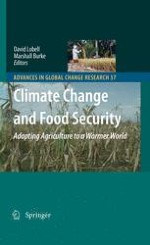
2010 | OriginalPaper | Buchkapitel
1. Introduction
verfasst von : David Lobell, Marshall Burke
Erschienen in: Climate Change and Food Security
Verlag: Springer Netherlands
Aktivieren Sie unsere intelligente Suche, um passende Fachinhalte oder Patente zu finden.
Wählen Sie Textabschnitte aus um mit Künstlicher Intelligenz passenden Patente zu finden. powered by
Markieren Sie Textabschnitte, um KI-gestützt weitere passende Inhalte zu finden. powered by